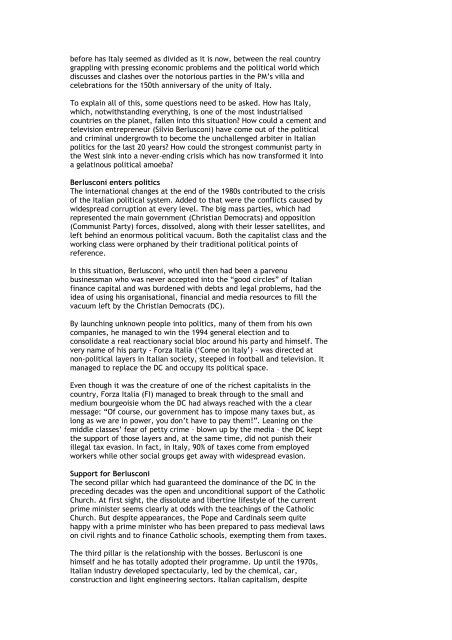April 2011 - Centre for Civil Society - University of KwaZulu-Natal
April 2011 - Centre for Civil Society - University of KwaZulu-Natal
April 2011 - Centre for Civil Society - University of KwaZulu-Natal
You also want an ePaper? Increase the reach of your titles
YUMPU automatically turns print PDFs into web optimized ePapers that Google loves.
e<strong>for</strong>e has Italy seemed as divided as it is now, between the real country<br />
grappling with pressing economic problems and the political world which<br />
discusses and clashes over the notorious parties in the PM’s villa and<br />
celebrations <strong>for</strong> the 150th anniversary <strong>of</strong> the unity <strong>of</strong> Italy.<br />
To explain all <strong>of</strong> this, some questions need to be asked. How has Italy,<br />
which, notwithstanding everything, is one <strong>of</strong> the most industrialised<br />
countries on the planet, fallen into this situation? How could a cement and<br />
television entrepreneur (Silvio Berlusconi) have come out <strong>of</strong> the political<br />
and criminal undergrowth to become the unchallenged arbiter in Italian<br />
politics <strong>for</strong> the last 20 years? How could the strongest communist party in<br />
the West sink into a never-ending crisis which has now trans<strong>for</strong>med it into<br />
a gelatinous political amoeba?<br />
Berlusconi enters politics<br />
The international changes at the end <strong>of</strong> the 1980s contributed to the crisis<br />
<strong>of</strong> the Italian political system. Added to that were the conflicts caused by<br />
widespread corruption at every level. The big mass parties, which had<br />
represented the main government (Christian Democrats) and opposition<br />
(Communist Party) <strong>for</strong>ces, dissolved, along with their lesser satellites, and<br />
left behind an enormous political vacuum. Both the capitalist class and the<br />
working class were orphaned by their traditional political points <strong>of</strong><br />
reference.<br />
In this situation, Berlusconi, who until then had been a parvenu<br />
businessman who was never accepted into the “good circles” <strong>of</strong> Italian<br />
finance capital and was burdened with debts and legal problems, had the<br />
idea <strong>of</strong> using his organisational, financial and media resources to fill the<br />
vacuum left by the Christian Democrats (DC).<br />
By launching unknown people into politics, many <strong>of</strong> them from his own<br />
companies, he managed to win the 1994 general election and to<br />
consolidate a real reactionary social bloc around his party and himself. The<br />
very name <strong>of</strong> his party - Forza Italia (‘Come on Italy’) - was directed at<br />
non-political layers in Italian society, steeped in football and television. It<br />
managed to replace the DC and occupy its political space.<br />
Even though it was the creature <strong>of</strong> one <strong>of</strong> the richest capitalists in the<br />
country, Forza Italia (FI) managed to break through to the small and<br />
medium bourgeoisie whom the DC had always reached with the a clear<br />
message: “Of course, our government has to impose many taxes but, as<br />
long as we are in power, you don’t have to pay them!”. Leaning on the<br />
middle classes’ fear <strong>of</strong> petty crime – blown up by the media – the DC kept<br />
the support <strong>of</strong> those layers and, at the same time, did not punish their<br />
illegal tax evasion. In fact, in Italy, 90% <strong>of</strong> taxes come from employed<br />
workers while other social groups get away with widespread evasion.<br />
Support <strong>for</strong> Berlusconi<br />
The second pillar which had guaranteed the dominance <strong>of</strong> the DC in the<br />
preceding decades was the open and unconditional support <strong>of</strong> the Catholic<br />
Church. At first sight, the dissolute and libertine lifestyle <strong>of</strong> the current<br />
prime minister seems clearly at odds with the teachings <strong>of</strong> the Catholic<br />
Church. But despite appearances, the Pope and Cardinals seem quite<br />
happy with a prime minister who has been prepared to pass medieval laws<br />
on civil rights and to finance Catholic schools, exempting them from taxes.<br />
The third pillar is the relationship with the bosses. Berlusconi is one<br />
himself and he has totally adopted their programme. Up until the 1970s,<br />
Italian industry developed spectacularly, led by the chemical, car,<br />
construction and light engineering sectors. Italian capitalism, despite
















